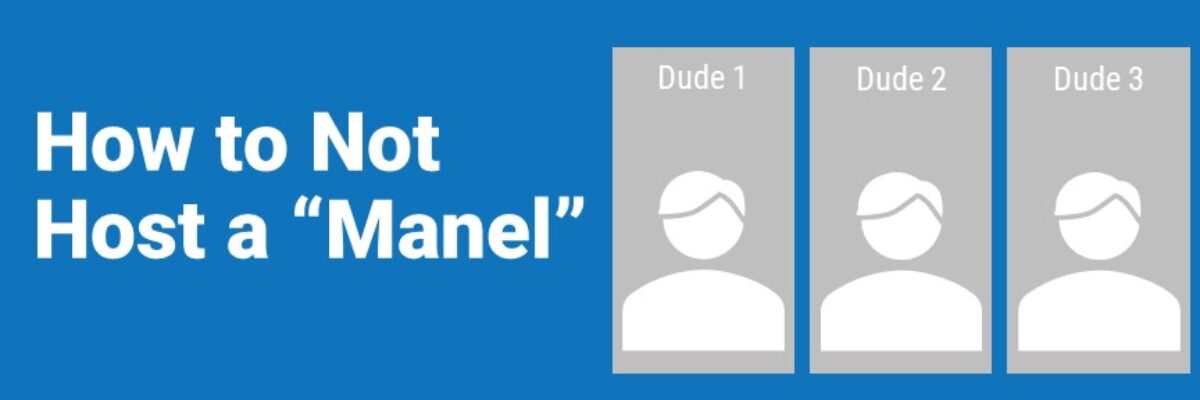How to Not Host a “Manel”
After a dust up on Twitter that I’ll explain below, I got so many white dudes in my DMs who wanted me to personally educate them on how to host a more inclusive set of keynotes and panelists at their conference. So I’m writing this post, without compensation, this one time, to point you all in the right direction. In the future, pay people for their consultation.
This discussion is focused on conferences and their keynotes and featured panelists but it also applies to podcasts, radio shows, YouTube interview series’, and any other places where you are hosting guest speakers. While I’m speaking pretty directly to the white dudes who host platforms, these points apply to a lot of white folks who say they “don’t know what to do” about racism in America.
A “manel” is a panel of speakers that are exclusively men.
The Dust Up
I’ll be as succinct as possible because the details aren’t important – the same situation comes up on a regular basis. A conference had used Twitter to promote a set of their featured speakers who “define data visualization” and all four speakers on their poster were white men. The speakers aren’t important, this isn’t their fault.
When I pointed this out in a tweet, the conference organizers made some rookie mistakes that told me they weren’t taking this very seriously:
- They got defensive in the public forum of Twitter but sent women from their organizing team to privately DM and email me with a much more open-minded tone.
- They said they tried to include more diversity among their featured speakers, but multiple men from the panel told me privately that they’d accepted this year’s invite because they’d been previous speakers at the same conference – so it doesn’t look like the organizers were trying that hard to find new voices.
- When others jumped into the Twitter conversation to express their surprise and tag dozens of prominent women in data visualization, the organizers reached out to those of us who were tagged with the *exact same* canned invitation email. Barf.
- They tried to use the excuse that they are in a male-dominated field without understanding their own complicit role in perpetuating the male domination. With platforms come responsibility. (And yes, the pipeline is another piece of this, which is not this blog post, but for starters, read through #BlackInTheIvory).
How to Not Host a “Manel”
In my tweet thread, I said that invited speakers can stick an inclusion rider into their contracts. An inclusion rider stipulates that my role in the conference is contingent on the requirement that other featured speakers and panelists are proportionately representative of United States (or wherever you are) demographics, meaning approximately 50% women, 50% people of color, 20% people with disabilities and 5% LGBTQ. I can cancel at any time with no notice if this stipulation is not met. Inclusion riders are a way for people with privilege to open up space for those who have been traditionally overlooked.
But instead of making the speakers come to you as the conference organizers with an inclusion rider, make this a core commitment – in fact, make this a POLICY – of your conference. Note intersectionality but do not try to find one queer black woman with a disability to check all your boxes. Do not hold your panel unless you can meet these bare minimums.
Are you freaking out? Afraid you’ll never have a panel again?
We need to unpack this real quick.
If you fear that you can’t find a panel of speakers that proportionately match US demographics, it is probably because your conference organizing team does not proportionately match US demographics either. I keynote enough conferences to know that pulling one together takes a ton of work. Usually that work is volunteer. People who have the spare time to volunteer are the ones who have the most privilege.
Solution: Pay conference organizers for their time and talent. You’ll attract a wider variety of people willing to organize. Then sit in the back so your voice is not the loudest one at the table. When you see people of color, especially women of color, talked over or dismissed, use your voice to redirect attention to them.
But usually we have a group of mainly white men organizing the conference or the podcast interviews or whatever and they inevitably end up claiming “we want more diversity but ‘those people’ don’t apply.” Um, hello? Why are you making people apply?
Solution: INVITE featured panelists and pay them for their time and talent.
Where will all this money come from?
Solution: No one wants another totebag.
So you have to know who to invite.
Solution: You have to actively follow, be interested in, and learn from people who are different than you. You have to earn their trust and camaraderie. Do not “lazy google” and simply tweet out that you want to know who to follow. That’s the equivalent of asking to copy my homework – it is inauthentic and you don’t actually learn. I’m talking here about listening more than you tweet and reading conversations between people who don’t look like you without interjecting your own opinions. I’m talking about doing the work to actually get to know more people. This can take years of investment. You’ll be a better person and a better conference organizer as you grow.
This is how you move from concerns (on all sides) about tokenism to true inclusivity.
I once got pushback on my inclusion rider from a conference organizer that he “wouldn’t feel comfortable asking if potential speakers were LGBTQ.” Dude, you don’t have to ask when you just know people in dataviz who are LGBTQ because you are friends with them, because you admire their work, because you are just in the community and you got to know them over time. This dude has never once interacted with me on social.
Solution: He’s not the right person to be organizing the conference.
You’ll end up thinking about accessibility policies and generating enforceable codes of conduct and you’ll end up with a better conference for everyone involved. Hell, you can even follow the models that others are working toward if you just did a little homework. Check out this example, recommended by Steph Locke. I’d like them to go even further, but they are at least being clear about how they are trying.
So rather than tell me you think women don’t apply to be speakers at your conference because they “lack confidence” (excuse me, I have to go scream into a pillow), try creating a culture that they want to join.
If you are hosting on some kind of platform, this is the responsibility you carry. And if you can’t carry it, you shouldn’t be hosting. Who you feature gets elevated. Who you elevate can either perpetuate the status quo or can help create the society that people are marching for right now.


